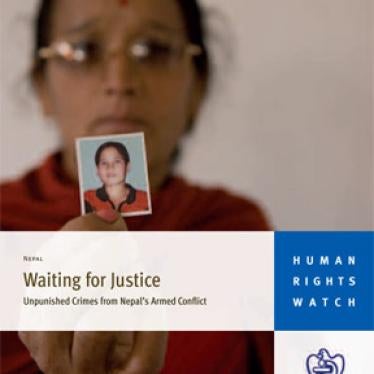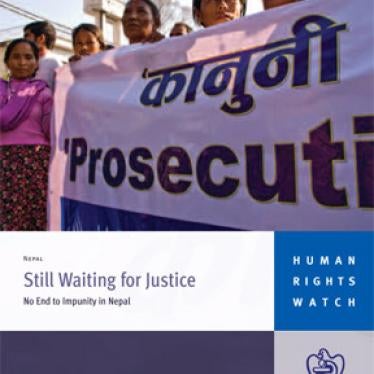(New York) - The Nepali government should redouble its efforts to investigate a 2005 extrajudicial killing after one of the suspects named by the authorities investigating the case, Agni Sapkota, was denied a visa to visit the US by its embassy in Kathmandu on June 26, 2010, Human Rights Watch said today. Sapkota is a senior member of the main Maoist party's Central Committee and was due to travel to Boston for training on negotiation tactics.
"No one - military or a civilian - is above the rule of law," said Tejshree Thapa, South Asia researcher at Human Rights Watch. "By denying Agni Sapkota's visa, the United States is sending a signal that there are consequences for failing to cooperate with investigations into grave human rights violations."
According to press reports, the US embassy has stated that the denial of a visa to Sapkota was due to "serious and specific human rights allegations associated with his conduct during the insurgency."
The abduction and alleged murder of Kavre resident 48-year-old Arjun Lama was committed during the ten year long civil war in Nepal between the Communist Party of Nepal-Maoist (CPN-M) and the government, which ended with the Comprehensive Peace Agreement on November 21, 2006. The conflict was ridden with egregious violations of human rights law and the laws of war on both sides. Despite both sides having, since 2006, repeatedly stated their commitment to accountability for the crimes, no one on either side has had to answer before a court for any of the well-documented allegations.
On the afternoon of April 19, 2005, witnesses saw members of the Maoist party abduct Lama as he celebrated his election as president of the secondary school in the Chhatrebanjh Village Development Committee in Kavre District. The Maoists claimed they had some business with him. Witnesses reported that Lama was paraded through several villages, and he has not been seen since. Lama's wife, with the help of nongovernmental organizations, tried to file a police report, but the police in Kavre initially refused to register it, fearing reprisals by the Maoists.
Eventually, a writ filed in the Supreme Court led to that court issuing a directive on August 11, 2008, ordering the Kavre police to register a murder case against six Maoists, including Sapkota, as the Maoist Central Committee member for the region. Under ongoing pressure from the United Nation's Office of the High Commissioner for Human Rights and local human rights groups, the police have conducted some tentative investigations, but the case remains stalled. As the local Maoist Central Committee member, Sapkota had authority over Maoists operating in the area.
Human Rights Watch investigated and documented the case against Sapkota in two reports, "Waiting for Justice" (September 2008) and "Still Waiting for Justice" (October 2009). These two reports documented extrajudicial killings and other abuses committed by government security forces, as well as by the Maoists, for which there has been no accountability. The leader of the Communist Party of Nepal-Maoist, M. Prachanda, has publicly accused Human Rights Watch of fabricating evidence against Sapkota but without providing any evidence to contradict the claims against him.
"Human Rights Watch stands by its findings," Thapa said. "If the Maoists think the charges against Sapkota are unfounded, they should be anxious and willing to participate in an investigation to try to clear his name."
The governments of India, China, the United Kingdom, the European Union, Japan, and other influential international entities should follow the example set by the United States and deny visas to persons against whom there is credible evidence of having committed serious crimes and for which there has been no investigation, Human Rights Watch said.
"The Nepali government should recognize that despite its own resistance, accountability for past abuses remains critical to the peace process," Thapa said. "Only when Nepal's government works toward justice for victims can we hope for an end to the pain of the country's decade-long civil war."








